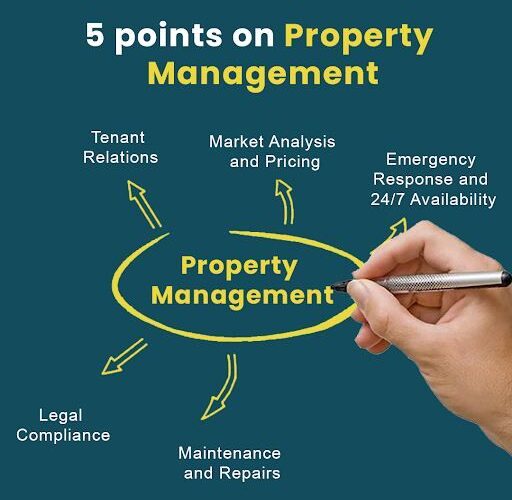
What Role Does Property Management Play in Real Estate Investments?
Real estate investments are often touted as one of the most reliable paths to wealth and financial independence. However, acquiring a property is only the first step in the journey. The real challenge lies in managing the property effectively to maximize its profitability and long-term value. Property management plays a pivotal role in this process.
Property management serves as the backbone of real estate operations, bridging the gap between property owners and tenants while ensuring smooth day-to-day operations. It encompasses a broad range of tasks, from tenant acquisition and maintenance to financial oversight and legal compliance. In this guide, we’ll explore the multifaceted role of property management and why it’s indispensable for successful real estate investments.
Understanding Property Management
Property management involves overseeing the operational aspects of rental properties. This includes managing tenants, maintaining the property, handling finances, and ensuring compliance with local regulations. For real estate investors, property management is critical for optimizing income, maintaining property value, and minimizing risks.
Key Responsibilities of Property Management
- Tenant Acquisition and Retention
Finding and retaining reliable tenants is fundamental to maintaining a steady income stream. Property managers excel in this area by handling:
- Marketing and Advertising: They use targeted strategies to advertise vacancies on high-traffic platforms, ensuring a wide reach to potential tenants. This includes crafting compelling listings with professional photos and detailed property descriptions.
- Tenant Screening: A rigorous screening process helps secure reliable tenants. This includes background checks, credit history analysis, employment verification, and rental history reviews. A good tenant reduces the risk of missed payments and property damage.
- Lease Agreements: Property managers draft comprehensive lease agreements that clearly outline the rights and responsibilities of both the landlord and the tenant. This minimizes disputes and ensures legal protection.
Once tenants are in place, property managers focus on retention by fostering a positive living environment and addressing tenant concerns promptly. High tenant retention reduces vacancy rates and the costs associated with turnover, such as cleaning, repairs, and marketing.
- Property Maintenance and Repairs
A well-maintained property not only attracts quality tenants but also preserves its value over time. Property management includes:
- Routine Maintenance: Regular inspections help identify potential issues before they become major problems. This includes checking plumbing, electrical systems, HVAC units, and structural elements.
- Timely Repairs: Property managers coordinate repairs with trusted contractors to ensure quality work and cost efficiency. From minor fixes to significant renovations, they oversee every step of the process.
- Preventive Maintenance: Scheduled services, such as pest control, gutter cleaning, and HVAC servicing, help prevent costly emergency repairs and prolong the property’s lifespan.
By staying proactive with maintenance, property managers protect the property’s condition and ensure tenant satisfaction.
- Financial Management
Effective financial management is crucial for maximizing a property’s profitability. Property managers handle:
- Rent Collection: They ensure rent is collected on time and manage late payments. Automated payment systems often streamline this process, reducing delays.
- Budgeting: Property managers create and manage budgets for operating expenses, including utilities, maintenance, and property improvements.
- Expense Management: They keep track of all expenses and seek cost-saving opportunities without compromising quality.
- Financial Reporting: Owners receive detailed financial statements, including income, expenses, and profit margins. These reports provide transparency and aid in decision-making.
Financial management ensures that the property remains profitable and that owners can plan for future investments or upgrades.
- Legal and Regulatory Compliance
Navigating the legal landscape of real estate can be complex. Property managers ensure that properties comply with all relevant laws, including:
- Local Landlord-Tenant Laws: These govern everything from security deposits and lease agreements to eviction procedures.
- Fair Housing Regulations: Property managers must ensure that all tenant interactions comply with fair housing laws, preventing discrimination based on race, religion, gender, or other protected characteristics.
- Property Codes and Safety Standards ensure that the property meets all safety regulations, including fire safety, electrical standards, and building codes.
In the event of a legal dispute, property managers can act as intermediaries, handling communications and legal proceedings on behalf of the owner. This reduces the risk of costly lawsuits and legal penalties.
The Impact of Property Management on Investment Success
- Maximizing Rental Income
A well-managed property generates consistent rental income and minimizes financial losses. Property managers optimize income by setting competitive rental rates based on market analysis and ensuring high occupancy rates through effective marketing and tenant retention strategies.
- Preserving and Enhancing Property Value
Regular maintenance and timely upgrades keep the property in excellent condition, protecting its market value. In addition, property managers may suggest value-adding improvements, such as modernizing interiors or adding desirable amenities, which can justify higher rents and attract premium tenants.
- Reducing Operational Risks
By handling tenant screening, legal compliance, and maintenance, property managers mitigate risks associated with delinquent tenants, property damage, and legal disputes. Their proactive approach ensures that potential issues are addressed before they escalate.
- Enhancing Tenant Satisfaction
Happy tenants are more likely to renew leases, reducing turnover rates and associated costs. Property managers achieve this by providing excellent customer service, addressing maintenance requests promptly, and fostering a positive living environment.
Choosing the Right Property Management Firm
Selecting a reliable property management firm is critical to the success of your investment. Here’s what to consider:
- Experience and Track Record: Look for firms with a proven history of managing properties similar to yours.
- Reputation: Seek referrals from other property owners or read online reviews to gauge client satisfaction.
- Range of Services: Ensure the firm offers comprehensive services, from marketing and tenant management to financial reporting and legal compliance.
- Technology Integration: Modern property management firms use advanced tools for rent collection, maintenance tracking, and communication, enhancing efficiency.
- Cost Structure: Understand the management fees and compare them with the services provided. Typically, property management fees range from 8% to 12% of the monthly rental income.
Conclusion
Property management is an integral component of real estate investment, directly influencing the profitability and long-term success of your assets. By taking over the daily operational responsibilities, property managers allow investors to focus on growth strategies and new opportunities.
From ensuring steady rental income and preserving property value to enhancing tenant satisfaction and minimizing risks, the benefits of effective property management cannot be overstated. Whether you’re a first-time investor or an experienced property owner, partnering with a competent property management firm can be the key to unlocking the full potential of your real estate investments.



